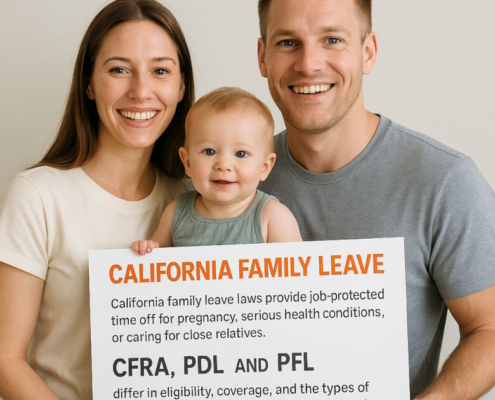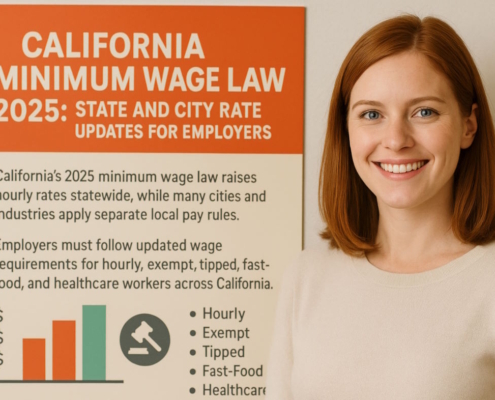Can I be fired for work restrictions?
No, you cannot be fired for work restriction if it is based on disability. However, an employer can fire an employee in some situations if the employee has work restrictions.
Author: Brad Nakase, Attorney
Email | Call (888) 600-8654
Can you lose your job because of work restrictions? If an employer cannot accommodate the employee’s work restrictions, the employer can terminate the employment. It is common for employees to have some form of work restriction, whether it is because of a disability, medical condition, pregnancy, religion, or other reason. Thankfully, there are state and federal laws that protect employees from retaliation from employers over protected characteristics or needed accommodations. An individual should not face discrimination and unfair treatment due to their need for accommodations or work restrictions. If an employee has been terminated for work restrictions, then the discrimination they likely experienced means they have the right to damages. An experienced lawyer can help an individual in this unfortunate situation get the justice they deserve.
In this article, our employment lawyer in San Diego will discuss work restriction law as follows:
What Is an Employee’s Right to Work Restrictions?
Employees and job applicants are protected by numerous state and federal laws, such as the Americans with Disabilities Act (ADA), that forbid discrimination based on disability. The word ‘disability’ also includes a disability caused by an injury that necessitates accommodations or work restrictions.
The unfortunate reality is that there are some circumstances in which an employer can legally fire an employee for their work restrictions. That said, an employer cannot fire and employee based on the fact he or she has a disability or other protected characteristic under the Fair Employment and Housing Act (FEHA). FEHA generally protects employees from discrimination based on a protected characteristic or activity, such as religion and gender. That said, whether one can be provided reasonable accommodation depends on the nature of one’s job, or one’s essential duties. For instance, if a warehouse worker injures his or her back and requires a lifting restriction to prevent further injury, some employers may not be able to accommodate this restriction; lifting is an essential function of a warehouse job position, after all.
If an employee has been fired for having work restrictions, it is vital that he or she consult an experienced employment lawyer who can help determine whether he or she has a worker’s compensation claim against the employer for unlawful retaliation.
What Damages Is an Employee Entitled to After Being Fired for Work Restrictions?
If an employee successfully settles a case of illegal firing after an injury that required work restrictions, then he or she could receive the following damages:
- Out-of-pocket medical fees
- Lost wages from the past, present, or future due to the disability discrimination endured
- Monetary compensation for mental anguish, including humiliation, anxiety, or emotional distress
- Punitive damages that help prevent medical discrimination in the future
- Lawyer’s fees and litigation costs
One form of damages available to an individual who was wrongfully terminated is emotional distress damages. Perhaps the firing had an impact on the employee’s daily life: loss of sleep, anger, frustration, self-doubt. A jury can award monetary amounts for this suffering. The emotional impact that a termination has on an individual in the future is known as futural emotional distress.
Another form of damages is known as back wages and front wages. When an individual makes less at a new job than they made at the job from which they were terminated, a jury may decide to make up the difference the individual is entitled to. Or, perhaps, the employee used to have health insurance or vacation. These losses may be compensated, as will the time an individual spends to find a new job.
Sometimes, depending on the employer and the situation, a lawyer will seek punitive damages to punish the former employer.
If the lawsuit is successful, then there will often be a motion for attorney’s fees and costs to be covered by the former employer.
What Qualifies as Wrongful Termination?
Most employees in California probably work at a job that is considered to be at-will employment. With this kind of work, an employer may fire an employee for whatever reason they feel like, or even for no reason at all. That said, they cannot fire an individual for a wrong or unlawful reason. To determine what kind of employee he or she is classified as, an individual should review his or her employee handbook. In any case, an employee is protected from an employer’s wrongful termination. Some employers may inform employees why they are being terminated, but they are not required to. If the employer has a reason, such as an individual’s poor job performance, then this is considered firing an at-will employee “for cause.” However, if the reason given breaks the law or an employee contract, then an individual cannot be legally fired. Reasons of an illegal nature include the following:
- Retaliation against a complaint
- A violation of anti-discrimination laws
- Firing an employee as a way to sexually harass an individual
- A violation of labor laws
If an individual is not sure whether he or she has a valid case, they should contact an experienced wrongful termination lawyer.
Wrongful Termination Based on Discrimination
In California, employers are not allowed to discriminate against employees based on personal characteristics. Individuals who share certain characteristics may be defined as a “protected class.” In California, protected classes include the following:
- Race
- Color
- Ancestry
- National origin
- Sex
- Gender identity
- Religion
- Age
- Disability
- Marital status
- Medical condition
- Political affiliation or activities
- Citizenship status
- Victims of domestic violence or assault
- Genetic information
- AIDS/HIV status
If an employee is fired for any of the above reasons, then they have grounds to sue for wrongful termination. Depending on the city in which one lives, there may be additional protected classes.
Collecting Evidence of a Wrongful Termination
When an individual hires a wrongful termination lawyer, the lawyer will study the evidence backing up the claim. A lawyer requires documents from the individual’s tenure, including their employee file. This could provide a reason why the employee was terminated. It could even indicate a potential illegal reason. A lawyer will proceed to gather information that may prove the employee was illegally fired. This will include looking at performance reviews. The lawyer will want to examine whether the employee was treated any differently than others. A red flag, for example, would be if the employee was fired for poor performance but received excellent reviews during their employment.
Fired Without Notice – Is There a Wrongful Termination Case?
Sometimes employees are fired without receiving any notice. They are simply called into a manager’s office and told they are being terminated. According to California law, employees are considered at-will, which means that they may be fired for any reason that is not unlawful. Also, there is no notice requirement. An employee may technically quit and simply not show up the next day, which means an employer may do the same. In essence, they could terminate an employee with the understanding that they will not engage with them again. Under California law, there is no notice requirement.
An employee should know that if he or she is fired, they are entitled to their wages up until the point of termination. If an employer fires an employee, he or she should be prepared to offer a check with all the employees’ wages, including that day’s pay. If the employer fails to do this, then an employee may be entitled to Labor Code Section 203 penalties. This is a waiting time penalty. It is also important to know that if an employee gets fired out of nowhere, he or she should think carefully about why they may have been fired. If, for example, an employee recently told his or her employer about their plan to go on medical leave or complained about unlawful or unsafe behavior, there could be a reason the termination breaks California law. In this case, the individual should contact an attorney.
Can an Employee Be Fired If They Have a Contract with an Employer?
While most California employees do not have contracts, some employees do have contracts for set periods of time (one year, or for a specific job). When it comes to terminating such a contract, the issue comes down to reading the contract and determining whether or not the employer could have an employee stop working. Also at issue is whether or not this would have an effect on the issue of pay; does the employer pay the employee out for the rest of contract or for a specified period of time? The contract will sometimes have provisions that state if an employer terminates an employee for just cause, they can cancel the contract. In California, whether or not an employee had a contract or is at-will, he or she is protected under state law from wrongful termination and unlawful discrimination and harassment.
If an employee is either an at-will employee or has a contract, then it is critical he or she understand their rights. At the end of their employment, a supervisor or HR will want the employee to sign an additional agreement called a separation agreement. In this document, they offer the employee money. Sometimes the money is two-weeks’ worth or a month’s worth, and occasionally more. An employee should understand that if the employer is doing this, then they want the employee do release their claims in exchange for the money. Indeed, if an employee signs this agreement and takes the money, he or she could be releasing the company for any claims. These claims may include wage claims and wrongful termination. If an employee is presented with such an agreement at the conclusion of their employment, then it is important that he or she is conscious of what rights they have and which rights they may be forfeiting. If an employee signs a contract at the beginning of their job, they should know that this does not keep him or her from searching for legal remedies outside the bounds of that contract.
How to choose the right attorney for wrongful termination because of a medical restriction for work?
Not every wrongful termination case ends in a verdict. In fact, many cases result in a settlement. If an individual is considering hiring a law firm to represent their interests, they should consider this the following factors. Does the firm focus on California labor and employment law? Perhaps their work focuses on workers’ compensation and wrongful termination, or retaliation and labor law issues. The next issue to consider is whether the firm has the necessary resources in addition to the expertise. An individual will want a firm that can take them the whole way. Specifically, an individual will want to determine whether the attorney is a trial attorney. Many people make the mistake of hiring a lawyer and preparing to go to court only to discover that their attorney has no trial experience. Therefore, it is important to find out about a lawyer’s expertise and experience from the get go.
What Should Someone Do If They Are Wrongfully Terminated?
It is important to understand that sometimes terminations are simply unfair, but not unjust. An individual may have the misfortune of working for a supervisor who is unkind and irrational, who may terminate them in a particularly harsh manner. But however wrongful a termination may feel, it is not necessarily unlawful.
A lawyer can help identify which terminations actually broke California or federal law. If an attorney can successfully identify a statute that was broken, then he or she can describe why the termination was wrongful and a violation of public policy. This claim will be brought with other claims under California Labor Code. These include the Fair Employment Housing Act, if the employee was terminated as a result of a protected class, or if they were subject to harassment based on race, gender, or disability. Not every firing in California will allow an individual to file a lawsuit. In fact, not even every wrongful termination will allow an individual to file a lawsuit. It is therefore important to find an attorney who can determine whether or not a termination was unlawful.
Can Someone Sue Their Employer Over Wrongful Termination?
In California, there are a lot of statutes that protect an employee. These laws, for example, prevent an employer from retaliating against an employee. An employee will need to determine whether something is wrong or unfair, or whether it was unlawful.
Can Someone Collect Unemployment Benefits If They Were Fired?
In California, if someone is terminated from their employment, they are not necessarily guaranteed unemployment benefits.
Still, if an employee has been fired, especially if they feel it was an unlawful termination, it is important for them to apply for unemployment. It would also be helpful to hire an attorney, who can help explain to the unemployment board why the employee is eligible for benefits.
Should Someone Look for a New Job During a Wrongful Termination Case?
It is common for people who have been wrongfully terminated to wonder what comes next. The most important thing is to continue to take care of oneself and one’s family. Therefore, it would be wise to file for unemployment. The next step would be looking for new work if possible. If an employer has fired an individual while they were out on medical leave, then it is best to continue taking that leave. The most important thing in this case is to get healthy. The law will expect an individual to find similar work. What is similar? This means the new job should be comparable to the old one in terms of wage, benefits, and location. To the degree that the new job does not offer the same benefits or wages as the previous one, a lawyer will try to make up the difference in court.
Blog: Business | Corporate | Employment Law
See all blogs: Business | Corporate | Employment
See all blog: Business | Corporate | Employment
































